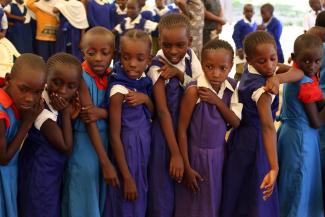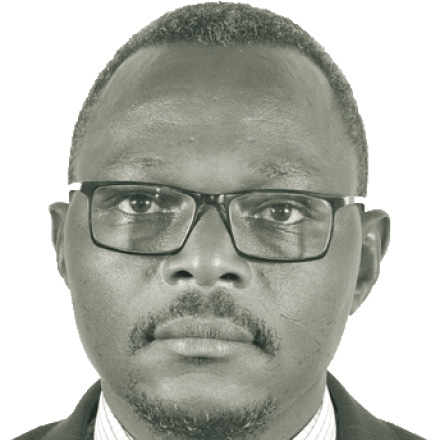Development policy
Not an end in itself

Development cooperation is repeatedly being criticised. Some people complain that it is a “waste of money” that would better be spent at home. Others wonder whether investments make sense in view of corruption in many places. Yet others claim that official development assistance (ODA) actually causes poverty by creating dependencies and absolving governments of their responsibilities. Such reasoning misses three points:
- Development policy has led to evident successes.
- Recipient countries are being held accountable.
- Development cooperation, in itself, cannot solve every problem, especially if its positive impacts are undermined by incoherent policies in other areas.
Since 1990, the share of people living in extreme poverty around the world has fallen from 35 to 10.7 %. Seventy-two developing countries have achieved the UN’s Millennium Development Goal of halving the proportion of people suffering from hunger. Almost 21 million people now have access to life-saving AIDS medications. That is over 20 million more than in 2000. For the first time, there are more people with access to AIDS-fighting drugs than there are new cases of HIV infections. Between 2010 and 2016, the number of deaths from malaria fell by 37 %. The number of children who die before their fifth birthday has fallen by more than half since 1990. In 2013, in sub-Saharan Africa alone, 65 million more children attended primary school than in 1999. These very specific successes would never have been possible without ODA.
Abstract numbers of such a scale are hard to imagine. But behind every number is a human life. In May of 2017, I had the opportunity to meet Connie Mudenda in Zambia. Connie lost three children to AIDS because she lacked access to the medications that would have prevented the babies from contracting HIV at birth. I also met Connie’s five-year-old daughter Lubona. In all likelihood, she is alive only because the medications in question have been available in Zambia since 2012, thanks to international aid.
Contrary to what many people think, development cooperation is not simply spending German money to dig a well or build a street somewhere. The reality is much more complex. A variety of innovative solutions bring the most diverse actors to the table in order for them to rise to major challenges together.
A good example is Gavi, the Vaccine Alliance. Gavi’s goal is to give all children worldwide access to vaccines. Over 20 % of all children under the age of five still die from diseases that could have been prevented by vaccines. Gavi can dramatically reduce the cost of the vaccines in negotiations with pharmaceutical companies by pooling demand and purchasing massive volumes. The countries that Gavi operates in pay a share of the immunisation costs, moreover, so they assume responsibility. Their involvement increases as their economies grow – until they ultimately become able to provide immunisation without foreign support. Countries like Angola and Congo-Brazzaville are on track to meet that goal. From 2000 to the end of 2018, a total of 700 million children will have been vaccinated with Gavi’s support and 10 million lives will have been saved. That is the opposite of ineffectiveness.
Those of us who work in development policy are often asked why we should invest in countries, where the funding is likely to trickle away. Yes, corruption is a problem. No development agency that takes its mission seriously would dispute that. It is not only a problem for development cooperation. In total, every year, $ 89 billion of money belonging to African states flows out of the continent through money laundering, shady transactions and illegal tax evasion. If only a portion of these stolen and diverted funds – keep in mind, these are not development funds – were lawfully taxed, developing countries could use the resulting additional tax revenue to fight extreme poverty. They could, for instance, invest in education, health care and infrastructure.
Without a doubt, it is first and foremost the responsibility of African governments to take action against corruption. However, we also know – thanks to revelations like the Panama Papers – that the international financial system abets tax evasion and corruption. Ultimately, the established “donor countries” profit from the illegal outflow of funds from developing countries. It cannot be repeated too often: while corruption is a problem in Africa, it is not a genuinely African problem. It is a global problem.
The most effective medicine in the fight against corruption is transparency. If citizens have access to information on how much money a government earns through the sale of commodities, how much development funding it receives and how many taxes large corporations pay, they will be able to track what is actually done with government revenues. That is why ONE encourages policymakers of the EU, the OECD or the G20, for instance, to create the political environment we need to drain the swamp of shell companies and illegal tax practices. African civil society must be empowered to hold African governments accountable. Otherwise, sustainable progress will be impossible. Calling on African governments to practice better governance, greater transparency and due process is hypocritical, to put it mildly, if such demands do not go along with action to boost transparency at the international level.
Last but by no means least, one must consider that development cooperation can only be successful if actions in other policy fields are coherent with its goals. It is difficult to diversify African economies and promote local value creation if at the same time we have obstructive trade regulations, for example. As long as the EU continues to flood African markets with highly subsidised agricultural products, it should come as no surprise that local farmers are disadvantaged. Many simply cannot sell their produce at Europe’s cut-rate prices.
Development aid is certainly not a panacea. Without it, however, the entire world, not just developing countries, would be much worse off. What is at stake is ultimately the fate of people like five-year-old Lubona. She represents thousands of children who are only alive thanks to development cooperation. I cannot think of a better argument for our work.
Stephan Exo-Kreischer leads the German office of ONE, an international campaigning and advocacy organisation.
https://www.one.org/de
Twitter: @BueroBerlin













